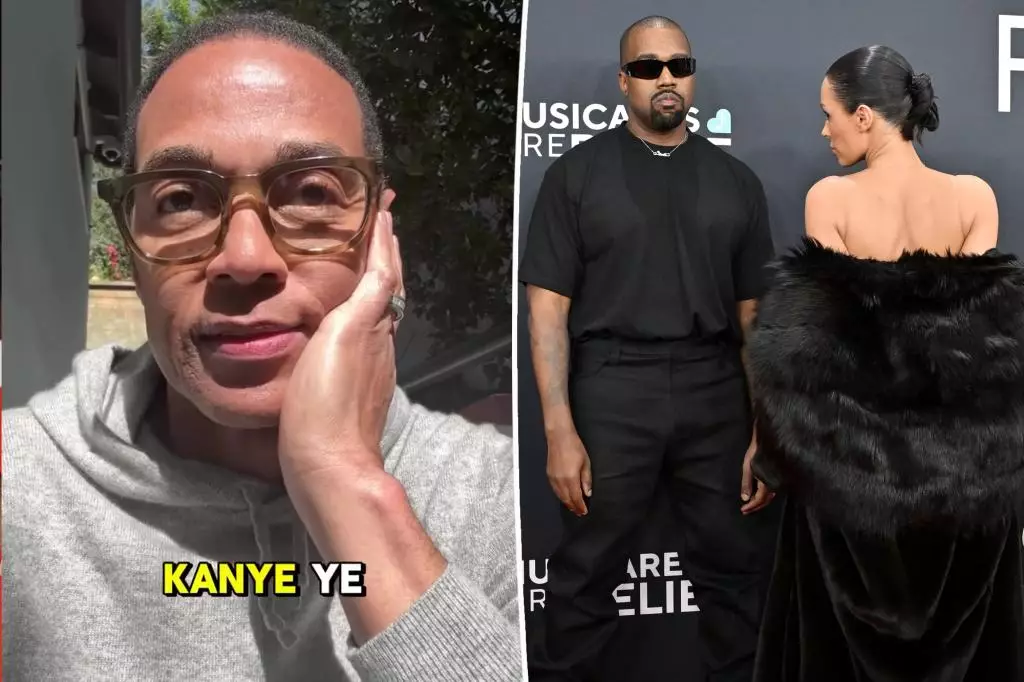The recent drama between CNN anchor Don Lemon and rapper Kanye West reveals deep-seated issues regarding respect, community dialogue, and the interpretation of public statements. The altercation began when Kanye West took offense at Lemon’s comments regarding his and Bianca Censori’s alleged removal from the Grammy Awards. Calling Lemon a “coon” on social media, West ignited a firestorm that highlights the complexities of their relationship as two black men navigating public discourse.
In the black community, certain words carry significant weight, and the term “coon” is an especially loaded one. Lemon’s response to West’s incendiary remark sheds light on the broader implications of such language. He expressed his disbelief at West’s choice to demean him, stating, “C’mon man, we’re both black men.” Lemon argues that mutual respect should guide their interactions, especially when both parties share similar ethnic backgrounds and cultural challenges. This moment forces us to consider the implications of public figures using derogatory terms against one another and the repercussions within their communities.
Lemon clarified his involvement in the Grammy controversy, emphasizing that he merely relayed a rumor without having firsthand knowledge of the incident. This raises an important consideration: Is it appropriate for media figures to disseminate unverified information? Lemon indicates he was only acting as a messenger, responding to the pandemonium surrounding West’s bold and daring fashion choices alongside Censori at the awards show.
Kanye West is often celebrated as a master of publicity and marketing. His style and conduct easily entice the media, prompting discussions that elevate his public profile. Lemon acknowledged this property of West, stating that he is “not surprised that he pulled a stunt.” In a world where attention spans are short and competition for viewer engagement is high, West’s eye-catching wardrobe choice—a revealing garment worn by Censori—possibly aimed to ensure he remained relevant in the media narrative.
Perhaps more importantly, however, is the fact that this moment transcended mere entertainment; it served as a reminder of how celebrities utilize their platforms to navigate personal branding. The fine line between notoriety and. tastefulness often becomes blurred in West’s world, exemplified by this bold moment on the Grammy carpet.
As an experienced media figure, Lemon highlighted the need for clarity and accountability in sharing information. He later addressed West directly in a social media response, insisting, “I did not start a rumor about you being kicked out of the Grammys.” This assertion underscores a dilemma journalists frequently face: the balance between reporting trending narratives and ensuring accuracy.
With social media serving as a double-edged sword—allowing for immediate dissemination of information while also perpetuating misunderstandings—the need for media professionals to navigate this landscape with precision is paramount. Lemon’s insistence that he merely corrected misinformation rather than spreading it adds to the discourse on journalistic integrity and the expectations that come with such visibility.
The ongoing feud between Lemon and West illustrates the tangled web of relationships within celebrity culture. Fans and followers eagerly consume headlines without fully grasping the nuances or context. Each statement made by figures like Lemon or West can reignite discussions that consume public attention, often obscuring more pressing social issues. This phenomenon raises the question of whether the ego-driven antics of celebrities overshadow their society’s urgent conversations and struggles.
Both men occupy unique spaces within the entertainment and media hierarchies. The very public nature of their clash serves as a microcosm of the discourse surrounding race, respect, and accountability that shapes our cultural landscape today.
Ultimately, the interaction between Don Lemon and Kanye West serves as an incisive commentary on the complexities of respect and misunderstanding in the public sphere. As both men navigate their respective roles, their conflict lays bare the responsibility that comes with influence in society. Instead of resorting to derision and insults, the situation calls for a more profound, empathetic dialogue that reinforces unity and respect within and beyond their community. How they choose to address these underlying issues could set vital precedents in promoting understanding and respect as central tenets of public engagement.
